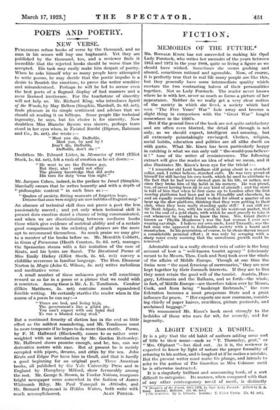FICTION,
MEMORIES OF THE FUTURE.*
Ma. RONALD Ksrox has not succeeded in making his Opal Lady Porstock, who writes her memoirs of the years between 1915 and 1972 in the year 1988, quite so living a figure as we should have wished. Sometimes she seems gushing and absurd, sometimes rational and agreeable.. Now, of course,
it is perfectly true that in real life many people are like this, but they generally have some intermediate quality which
mortars the two contrasting halves of their personalities together. Not so Lady Porstock. The reader never knows where he is with her, never so much as forms a picture of her appearance. Neither do we really get a very clear notion of the society in which she lived, a society which had seen "The Five Years' War" fade away and become a slight thing in comparison with the "Great War" fought somewhere in the 1960's.
But if the general lines of the book are not quite satisfactory and are often even blurred, the detail all through is not only, as we should expect, intelligent and amusing, but all extremely painstakingly envisaged. Clothes, religion, social habits, education and politics are all alike dwelt on
with gusto. What Mr. Knox has been particularly happy in catching is what we can only call " the-would-you-believe- it ! " tone of the writer of reminiscences. The following extract will give the reader an idea of what we mean, and it also illustrates Mr. Knox's keen eye for the trivial :—
" I remember old Lord Sandham still going about in a starched collar, and, I rather believe, starched cuffs. He was very proud of himself for still having his own teeth, which he used to attribute to the fact that he had never chewed gam in his life, or rather, not since they broke him of they habit in his nursery. He was proud, too, of never having been dp in any kind of aircraft ; and the story is told of him that when he first came up to London after the first moving platforms had been put in in Piccadilly and elsewhere, he and an equally countrified friend walked for about a quarter of an hour up the slow platform, thinking that they were getting to their club, when they were really standing quite still ! I can still see Sir Mark Adgate, too, with his watch in his waistcoat pocket, tied on to the end of a gold chain, with which he used gravely to take it out whenever he wanted to know the time. Mrs. Grant (better known as ' Phyllis Meadowes ') was the last woman I ever saw wearing ear-rings. I believe my own uncle, Lord Trecastle, was the last man who appeared in fashionable society with a beard and moustaches. In his generation, of course, to be clean-shaven meant a considerable personal effort ; it was only by scraping with is sharp razor every morning that the unwelcome growth could be removed."
Admirable and in a really elevated vein of satire is the long account of how a " well-known tourist agency " (obviously meant to be Messrs. Thos. Cook and Son) took over the whole of the affairs of Middle Europe. Though at one time the Swiss were " the most ferocious of mercenaries," they are now kept together by their common interests. If they are to live
they must retain the good will of the tourist. Austria, Hun- gary, Lithuania and the Balkans, and so forth—the whole,
in fact, of Middle Europe—are therefore taken over by Messrs. Cook, and from being " bankrupt firebrands," the con- federation becomes a most prosperous State and a great influence for peace. " Her exports are now enormous, consist-
ing chiefly of paper knives, crucifixes, picture postcards, and unclaimed baggage."
We recommend Mr. Knox's book most strongly to the bedsides of those who care for wit, for comedy, and for ingenuity.










































 Previous page
Previous page